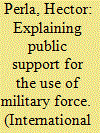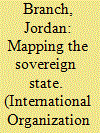|
|
|
Sort Order |
|
|
|
Items / Page
|
|
|
|
|
|
|
| Srl | Item |
| 1 |
ID:
102546


|
|
|
|
|
| Publication |
2011.
|
| Summary/Abstract |
The global financial crisis that erupted in summer 2007 has made the reform of international prudential financial regulation one of the top priorities of global public policy. Past scholarship has usefully explained the creation and strengthening of international financial standards with reference to three policy arenas: interstate, domestic, and transnational. Despite the accomplishments of this specialist literature, the recent crisis has revealed a number of limitations in the ways scholars have understood interstate power relations, the influence of domestic politics, and the significance of transnational actors within international financial regulatory politics. Taken together, developments in each of these three arenas suggest that researchers may also need to be prepared to shift from explaining the strengthening of official international standards to analyzing their weakening in the postcrisis world. The latter task will require scholars to devote more analytical attention to a wider set of international regulatory outcomes, including "informal regulatory convergence," "regulatory fragmentation," and especially "cooperative regulatory decentralization."
|
|
|
|
|
|
|
|
|
|
|
|
|
|
|
|
| 2 |
ID:
102544


|
|
|
|
|
| Publication |
2011.
|
| Summary/Abstract |
This article examines the determinants of public support for the use of military force. It puts forward a Framing Theory of Policy Objectives (FTPO), which contends that public support for military engagements depends on the public's perception of the policy's objective. However, it is difficult for the public to judge a policy's objective because they cannot directly observe a policy's true intention and influential political actors offer competing frames to define it. This framing contestation, carried out through the media, sets the public's decision-making reference point and determines whether the policy is perceived as seeking to avoid losses or to achieve gains. The FTPO predicts that support will increase when the public perceives policies as seeking to prevent losses and decrease when the public judges policies to be seeking gains. I operationalize and test the theory using content analysis of national news coverage and opinion polls of U.S. intervention in Central America during the 1980s. These framing effects are found to hold regardless of positive or negative valence of media coverage.
|
|
|
|
|
|
|
|
|
|
|
|
|
|
|
|
| 3 |
ID:
102541


|
|
|
|
|
| Publication |
2011.
|
| Summary/Abstract |
Quotas to promote women's representation in the world's legislatures have spread to more than one hundred countries. The diffusion of gender quotas poses a puzzle since they have often been adopted in countries where women have low status. International influence and inducements best explain quota adoption in developing countries. Promoting gender equality, including through gender quotas, has become a key part of international democracy promotion. The international legitimacy of gender quotas leads them to be adopted through two causal pathways: directly, through postconflict peace operations, and indirectly, by encouraging countries, especially those that depend on foreign aid, to signal their commitment to democracy by adopting quotas. An event history analysis, which controls for other relevant factors, shows that the hypothesized relationships exist. Further support comes from a process-tracing analysis of Afghanistan's 2004 quota.
|
|
|
|
|
|
|
|
|
|
|
|
|
|
|
|
| 4 |
ID:
102536


|
|
|
|
|
| Publication |
2011.
|
| Summary/Abstract |
This article examines the effect of cartography on the development of the modern state system. I argue that new mapping technologies in early modern Europe changed how actors thought about political space, organization, and authority, thus shaping the creation of sovereign states and international relations. In particular, mapping was fundamental to three key characteristics of the medieval-to-modern shift: the homogenization of territorial authority, the linearization of political boundaries, and the elimination of nonterritorial forms of organization. Although maps have been interpreted as epiphenomenal to political change, each of these three transformations occurred first in the representational space of maps and only subsequently in the political practices of rulers and states. Based on evidence from the history of cartographic technologies and their use by political actors, the practices and texts of international negotiations, and the practical implementation of linearly bounded territoriality by states, this article argues that changes in the representational practices of mapmaking were constitutive of the early-modern transformation of the authoritative structure of politics. This explanation of the international system's historical transformation suggests useful new directions for investigations into the possibility of fundamental political change due to the economic, social, and technological developments of globalization.
|
|
|
|
|
|
|
|
|
|
|
|
|
|
|
|
| 5 |
ID:
102540


|
|
|
|
|
| Publication |
2011.
|
| Summary/Abstract |
While a number of significant campaigns since the early 1990s have resulted in bans of particular weapons, at least as many equivalent systems have gone unscrutinized and uncondemned by transnational campaigners. How can this variation be explained? Focusing on the issue area of arms control advocacy, this article argues that an important influence on the advocacy agenda within transnational networks is the decision-making process not of norm entrepreneurs nor of states but of highly connected organizations within a given network. The argument is illustrated through a comparison between existing norms against landmines and blinding laser weapons, and the absence of serious current consideration of such norms against depleted uranium and autonomous weapons. Thus, the process of organizational issue selection within nongovernmental organizations (NGOs) and international organizations (IOs) most central to particular advocacy networks, rather than the existence of transnational networks around an issue per se, should be a closer focus of attention for scholars interested in norm creation in world politics.
|
|
|
|
|
|
|
|
|
|
|
|
|
|
|
|
| 6 |
ID:
102538


|
|
|
|
|
| Publication |
2011.
|
| Summary/Abstract |
In this article we bring together opposing international relations theories to better understand U.S. foreign policy, in particular foreign trade and aid. Using votes in the U.S. House of Representatives from 1979-2004, we explore different theoretical predictions about preferences for foreign economic policy. We assess the impact of domestic factors, namely political economy and ideological preferences, versus foreign policy pressures. Our three main results highlight the differential effect of these factors in the two issue areas. First, aid preferences are as affected by domestic political economy factors as are trade preferences. Second, trade preferences, but not economic aid ones, are shaped by the president's foreign policy concerns; for economic aid, domestic political economy factors matter more than foreign policy ones. Third, aid preferences are shaped more by ideological factors than are trade ones, but ideology plays a different substantive role in each. Different constituencies support aid and trade. This finding has implications for foreign policy substitutability, "the internationalist coalition" in U.S. foreign policy, "statist" theories of foreign policy, and the connection between public opinion and legislative voting.
|
|
|
|
|
|
|
|
|
|
|
|
|
|
|
|
|
|
|
|
|